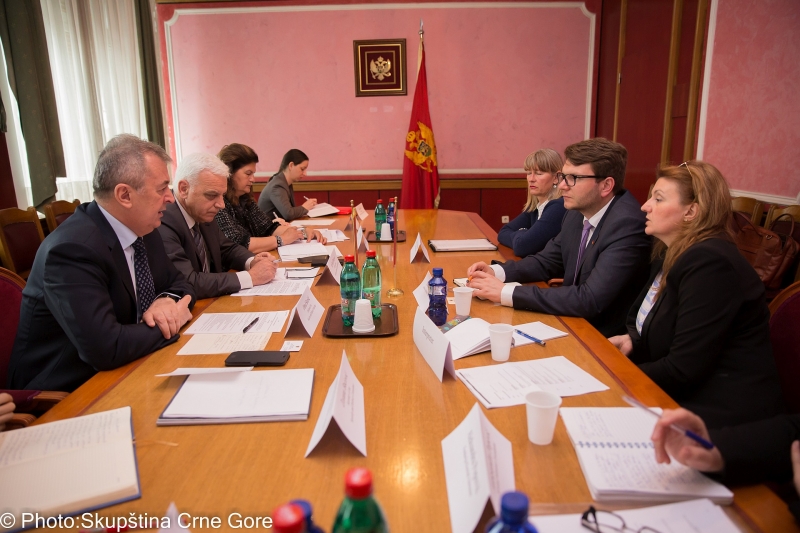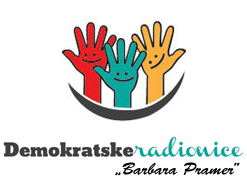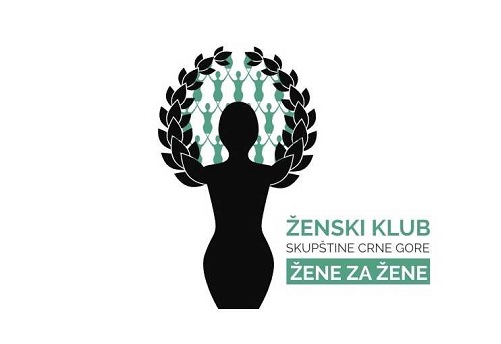MP Mr Wendt, a member of the Committee on Internal Affairs, which among other things deals with extremism, migrations, and refugees, informed them that he had visited a series of countries in which migrants stay and was interested in the state of affairs in Montenegro in this field. Stating that he viewed bilateral relations of Germany and Montenegro within the Balkan Strategy, her pointed out that cooperation of the two countries should be intensified, especially in the field of politics, tourism, and culture. He was inquiring about internal security situation in Montenegro, whether there was extremism and influence of foreign political powers.
Chairperson of the Committee on Human Rights and Freedoms Mr Halil Duković estimated that the refugee and migrant crisis in Europe was viewed from the security aspect, while Montenegro still approached that problem from the aspect of human rights. He emphasised that Montenegro, although a small state, had a large experience in refugee crises and said that in 1999, almost 20% of the overall population of Montenegro consisted of refugees and displaced persons from the territory of former Yugoslavia. The most important thing was that Montenegro had provided safety for all these persons. Enormous efforts were made to resolve their legal status, which resulted in resolving the status for 13,499 persons, while the procedure is ongoing for 688 requests. The Law on Foreigners was amended three times for the purpose of prolonging the deadline for submission of requests for regulating the status of these persons. He reminded that the Ministry of Interior opened a field office for receiving requests for regulating the status of displaced and internally displaced persons in the territory of Camp Konik, which also showed the willingness of Montenegro to meet the needs of these persons. Displaced and internally displaced persons, as well as all other citizens of Montenegro, have access to all rights in the areas of social protection, health care, and education, in accordance with the law. He regards as a special success the fact that Roma children are included in all levels of education, that the percentage of their quitting school is small, and that 20 of them are studying in faculties.
Mr Halil Duković pointed out the significant role of the Committee on Human Rights and Freedoms in this field, stating that through visits to Camp Konik, control hearings of the responsible persons for permanent resolution of the issues of displaced and internally displaced persons in Camp Konik, and consideration of information on activities of the Government of Montenegro in this field, the Committee continuously monitored the situation and obliged the authority bodies to undertake further measures to resolve their problems. By participating in the Regional Housing Programme, Montenegro resolved the housing issue of a large number of displaced and internally displaced persons. Camp Konik II was closed in December 2016, and after building additional 120 housing units in Camp Konik I, it will also be closed during this year. Construction of 94 housing units is expected in Berane.
The Chairperson of the Committee said that Montenegro was not directly hit by the current migrant crisis, however, by adopting Action Plan in case of possible inflow of migrants, the Government of Montenegro determined measures for action in this field.
Chairperson of the Security and Defence Committee and member of Permanent Delegation of the Parliament of Montenegro to the NATO Parliamentary Assembly Mr Obrad Mišo Stanišić said that Montenegro was at the very threshold of NATO, because Spain was expected to ratify the NATO Accession Protocol for Montenegro soon, and Montenegrin Parliament was also expected to vote on it. He said that in the recently held meeting of the Standing Committee of NATO Parliamentary Assembly in Berlin he listened with pleasure about Montenegro’s democratic steps forward in Euro-Atlantic integration. He estimated that there were numerous areas of cooperation between Montenegro and Germany, and especially in tourism and exchange of experiences from the particularly demanding negotiation chapter “Environment and sustainable development”. He thanked Germany for its support in MONDEM project for destruction of surplus of weapons in Montenegro, emphasising that 4/5 of those weapons were destroyed. He estimated that, in the coming period, parliamentary cooperation of the two countries should be intensified, especially through study visits.
MP Mr Stanišić informed his interlocutor that on 16 October the Euro-Atlantic option won the parliamentary elections, as well as that the opposition was boycotting the work of the Parliament. He said that the opposition campaign received support from abroad, as well as that the Democratic Front’s protests had the logistic, informational, and financial support of Russia. On the day of the parliamentary elections there was an attempt of destabilisation of Montenegro with foreign influence, and the prosecutorial investigation, which is ongoing, also included the leaders of the Democratic Front. The goal was to stop Montenegro on its Euro-Atlantic path. He deems as especially important Montenegro’s response to these security challenges, thus proving that it belongs in the company of NATO member states. His opinion is that the organised crime, present in the region and in Europe, must be resolved through international cooperation.
MP Mr Wendt said that, according to the operative data, it was evident that the Russia led the coup attempt on the election day, aiming to alienate Montenegro from NATO. He spoke of attempts to influence the public opinion in Germany through fake news and wanted to know whether such practice existed in Montenegro. Members of Montenegrin Parliament informed him that such practice also existed in Montenegro, which was especially visible during protests of the Democratic Front. Nowadays, reporting of Russian state media inviting citizens of Russia not to visit Montenegro is topical.
Mr Halil Duković informed MP Mr Wendt that in May 2016 they adopted the Law on Implementation of the Agreement on Creating Conditions for Free and Fair Elections, the so-called Lex Specialis, enabling the representatives of the opposition to govern the Ministry of Finance, Ministry of Labour and Social Welfare, and Ministry of Interior, as well as to take up numerous position in state and local administration. That enabled them to control all flows of state money. In the period of six months they did not record misuse of state resources which would affect fair and free elections.
MP Mr Wendt asked a question on priorities of the Government of Montenegro, and MP Mr Obrad Mišo Stanišić responded that the emphasis in the Work Programme of the Government was on the macroeconomic policy, especially raising the employment rate and strengthening of infrastructure. The goal was to balance the regional development, and the construction of the highway would contribute to development of the north of the country. The Government of Montenegro makes significant efforts both for development of tourism and production of healthy food, and numerous activities in the field of ecology are being implemented. MP Mr Stanišić emphasised that Montenegro was rich in natural potential which should be valorised in a proper manner, and through foreign investments in the field of tourism and economy would contribute to presenting our country as one of the most attractive tourist destinations.
MP Mr Marian Wendt pointed out that in Germany there was a problem with foreign mercenaries who go to international battlefields and that there were between 500 and 600 of them. MP Mr Obrad Mišo Stanišić responded to his interest in the situation in this field in Montenegro that the number of those people in our country was negligible and that in the previous year there had been no cases of unauthorised departures of Montenegrin citizens to international battlefields. Amendments to the Criminal Code from 2015 contributed to this, prescribing that citizens who depart to foreign battlefields or participate in foreign military, paramilitary and police units would be rigorously punished. The Security and Defence Committee deals with this issue in continuity through consideration of reports of authority bodies.
MPs Mr Stanišić and Mr Duković emphasised that Montenegro stood out because of its good regional cooperation, was the only one in the region that did not have war and it managed to keep multi-ethnic harmony in the times when its neighbours were involved in war conflicts. A special success of Montenegro was the fact that it took back its independence in a demanding democratic manner “with a pen”.
The interlocutors concluded that in the new Balkans Strategy adopted in Bundestag, which would be presented in May, the emphasis should be on resolving the pressing issues of the Western Balkans and improvement of infrastructure. Furthermore, it was estimated that the European Union must be protected even in the midst of an attempt to destabilise it, and the best way to sustain it is to continue with integration.
The participants in the meeting agreed that Germany’s support to Montenegro in Euro-Atlantic integration was significant and that strengthening of bilateral cooperation should continue.



















